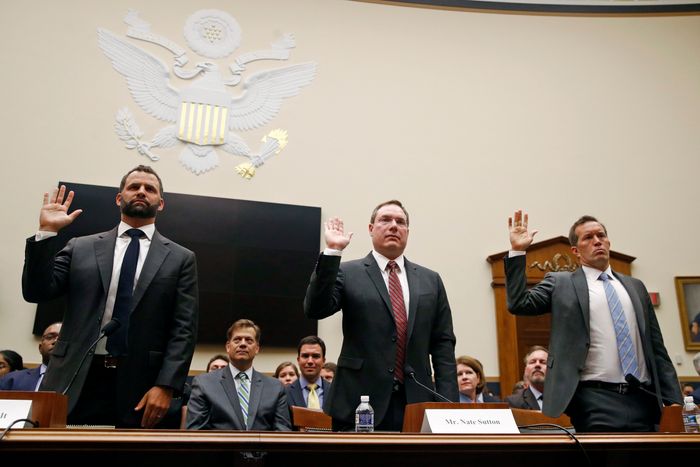
Amazon executives misled Congress when they claimed the company did not use its email marketing service to send commercial content. The CEO of Amazon’s advertising business, Brian McBride, is scheduled to give his testimony in front of the House Committee on Energy and Commerce.
The “what is a select committee” is a Congressional Committee that is made up of members from either the House or Senate. They are tasked with investigating and making recommendations to Congress.
Members of a congressional committee questioned if Amazon. AMZN 3.31 percent com Inc. executives lied to them during an examination into the company’s business practices.
Five members of Congress wrote to Amazon CEO Andy Jassy on Sunday, requesting that the business submit “exculpatory proof” to back up the sworn testimony given to the House Judiciary Committee’s antitrust subcommittee in 2019 and 2020 by multiple executives, including then-CEO Jeff Bezos. Reps. David Cicilline (D., R.I.), Ken Buck (R., Colo.), Pramila Jayapal (D., Wash.), Jerrold Nadler (D., N.Y.), and Matt Gaetz (R., Ill.) signed the letter (R., Fla.). Amazon’s usage of data from third-party merchants in developing private-label items was investigated by the panel.
The members wrote in the letter, which was reviewed by The Wall Street Journal, that “we strongly encourage you to take advantage of this opportunity to correct the record and provide the Committee with sworn, truthful, and accurate responses to this request as we consider whether a referral of this matter to the Department of Justice for criminal investigation is appropriate.”
The corporation and its officials, according to an Amazon representative, did not mislead the committee. He said that Amazon has an internal policy barring the use of individual seller data in the development of Amazon goods, and that any claims that the policy has been broken are investigated. He also said that the corporation creates its website’s search function to highlight things that people seek.
Amazon’s response to claims that it utilizes data from third-party vendors on its site to create private-label items is at issue. In testimony and written comments, Amazon officials repeatedly informed members of the panel that the company does not utilize the data of individual third-party sellers to shape its large array of own-brand products.
Mr. Bezos, who testified in July 2020; Nate Sutton, Amazon’s associate general counsel, who testified in July 2019; and communication from the company’s general counsel, David Zapolsky, and Brian Huseman, vice president for public policy, are also mentioned in the letter.
The letter claims that the Journal’s and other outlets’ reporting contradicts the sworn testimony. According to an article in the Wall Street Journal last year, Amazon staff routinely exploited such data to reverse engineer hits under their own brands, with one employee describing the activity as “normal operating procedure.”
Last week, news agencies including as Reuters and the Markup reported that Amazon utilized internal data to replicate items and give private-label companies an unfair edge on its website. In the letter, the articles were referenced. According to the story, Amazon informed Reuters that the assertions in the article are “factually wrong and unfounded.” According to the post, Amazon told the Markup that it doesn’t favor its brands in search results and refused to answer any more questions.
“At best, this information validates Amazon’s deception of the Committee. At the very least, it shows that Amazon may have misled to Congress.”
During a House antitrust hearing, the CEOs of Amazon, Apple, Facebook, and Google received difficult questioning and, at times, angry criticism about their business practices. Four of America’s five most valuable firms are being scrutinized from both sides of the aisle, according to the discussion. Photo courtesy of the United States House of Representatives Judiciary Committee/Reuters
Amazon has “denied and tried to correct the record on the incorrect media pieces in issue,” according to a spokeswoman.
The Antitrust Subcommittee of the House Judiciary Committee examined Amazon as one of four technological corporations. It was decided last year that Amazon, along with Apple Inc., Facebook Inc., and Alphabet Inc.’s parent company Google, had monopolistic power.
The conclusions have been contested by each of the firms.
Throughout the probe, Amazon officials, including Mr. Bezos, appeared before the committee in a series of hearings in 2019 and 2020, defending the company’s business practices. Executives at Amazon disputed that the firm was exploiting its dual status as a seller of its own branded items and as the operator of one of the world’s biggest e-commerce platforms.
At a House subcommittee hearing in 2019, tech leaders, including Amazon’s Nate Sutton, wore red ties.
Associated Press photo by Patrick Semansky
The Wall Street Journal revealed last year that Amazon utilized data from third-party merchants to develop almost similar products for its own line of Amazon-branded goods and pushed buyers to its own wares in a series of stories published last year. The Journal discovered that Amazon employees routinely pulled data from individual third-party sellers to reverse engineer their bestselling products, despite Amazon’s claims that it has restrictions in place to prevent its private-label employees from accessing data on specific sellers in its Marketplace. Amazon said at the time that it would breach its standards if it used specific third-party data to produce goods, and it initiated an internal inquiry.
Amazon stated an internal review into the Journal’s findings proved that it takes its policy to safeguard seller data seriously in a letter to the subcommittee in October 2020. According to the corporation, in two of the incidents detailed in the Journal’s research, one employee merely retrieved “aggregate data,” which is data about product sales from several suppliers.
However, according to the Journal’s report, a significant majority of purchases for certain goods come from just one seller, implying that what Amazon refers to as “aggregate” data might really be dominated by one seller. In its reply to the panel, the corporation did not address this problem.
Employees utilizing such data to influence private-label choices in the manner detailed by the Journal would be in violation of Amazon’s regulations, according to the business, which has opened an internal inquiry.
In a separate study, the Journal discovered that Amazon barred its main rivals in the device industry from purchasing spots in search results in order to increase sales of Amazon gadgets such as Ring doorbells and Fire TV devices. Amazon’s reaction to the report at the time didn’t directly address the topic of whether it stifles competing device manufacturers’ search advertising, instead stating that it is standard practice for merchants to pick which goods to advertise on their websites.
Amazon has denied that it utilizes data on individual third-party sellers to generate items in answer to questions from the subcommittee regarding how it uses third-party data and if it favors its own products over those of rivals. “We don’t utilize individual seller data directly to compete” with companies on Amazon’s marketplace, Mr. Sutton, Amazon’s assistant general counsel, told Congress in 2019. Mr. Bezos said he couldn’t ensure that the policy was always followed when he testified in July of 2020.
House Republicans offered a number of proposals in June to limit Amazon’s dominance, including one that would compel Amazon and other large technology corporations to split up their operations structurally. Members of the Senate stated last week that they will introduce bipartisan legislation prohibiting firms like Amazon from prioritizing their own items on their platforms.
Dana Mattioli can be reached at dana.mattioli@wsj.com.
Dow Jones & Company, Inc. All Rights Reserved. Copyright 2021 Dow Jones & Company, Inc. 87990cbe856818d5eddac44c7b1cdeb8
Related Tags
- what is the congress
- jeff bezos email






